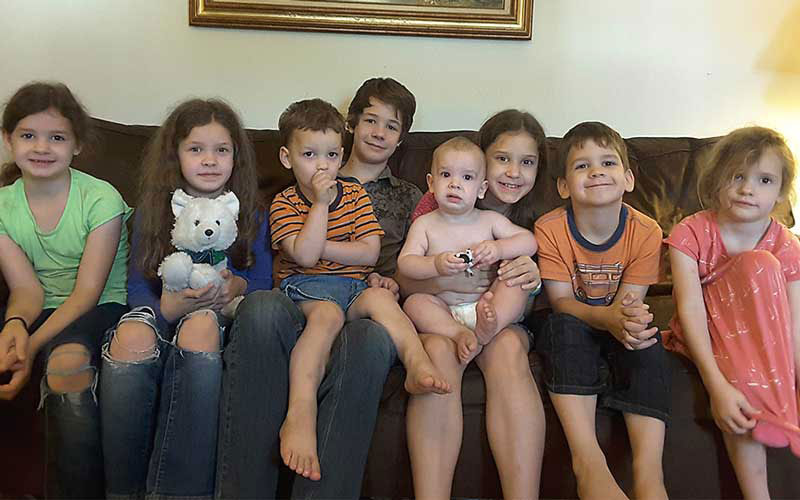
This post is part of our how to homeschool lots of kids with babies and toddlers series. Be sure to read the rest of the series.
Homeschool moms have vivid imaginations. We are able to think of all kinds of wonderful things we’d love for our kids to learn and experience.
From classic literature to classical music, from nature study to picture study, we can make a list a mile long of all the educational wishes we have for their children.
But the more kids you add to the mix, the more complicated it becomes to find the time to explore all of those different areas of skill and learning.
There’s something else homeschool moms are good at. We are good a feeling guilty for all the ways we imagine our kids are “missing out”.
We are good a making lists of all of the things we aren’t doing, that are kids aren’t learning and becoming discouraged about it all.
I’m sorry, but it’s just a fact. No mom, no matter how organized, can do all.the.things. And if you’re teaching multiple ages, you might be able to do even fewer.of.the.things. Academically speaking, that is.
More Kids, Less Learning?
Yes, if you’re measuring by subjects and curriculum chapters, you might accomplish less per kid as your family grows. But today, I’d like to focus our attention on what our kids are learning because they have the siblings they have.
It’s easy to measure progress through a workbook or number of writing assignments completed. But I’d like to balance the scales by helping us to appreciate some of the intangible, but extremely valuable, lessons that are happening in your home every day.
Love by Service
Big kids with little siblings get lots of practice with all things baby and toddler. Changing diapers, pushing strollers, and reading board books are certainly valuable skills to learn. We see the “home ec” lessons in action.
But the learning goes deeper than that. Our kids are learning that love grows when we serve others. Materially speaking, little people contribute nothing to the work of the household. Yet we adore them!
God has designed the family to show us the blessing of serving, to give us first-hand experience of the concept that that giving is better than receiving. He shows us that the act of serving actually grows our love for the person we are working to help.
Relationship Skills
The family of origin is the relationship lab of life. Siblings see each other’s weaknesses, share common space and property, and rub up against each other frequently each day – especially if they are homeschooled!
Home is where our children learn to fight well. Conflicts are going to happen all throughout life. The real question is whether they will have practice at knowing how to handle it wisely.
When children are young, the stakes are low. Losing your temper still causes problems. But it’s not going to end a marriage or get you fired from your job.
And both parties in the conflict have the same loving parent who cares about each of them and who can be a guide and example to both of them as they grow in understanding how to relate graciously to others.
Diversity and Empathy
If we want to raise children who appreciate a diversity of people and cultures, the home is the place to start. No, I’m not suggesting that interacting with one’s ethnically homogeneous siblings is the ultimate experience of diversity. But remember that home is the relationship lab.
If I’ve heard it once, I’ve heard it a thousand times. “Oh, they are all so different!” If you’ve got more than one kid, you know that siblings are rarely cookie-cutter copies of each other.
Even if they look a lot alike, the differences are more than skin-deep. You may have boys and girls. Older kids and younger ones. Introverts, extroverts, loud kids and quiet ones. Readers, athletes, designers, and musicians.
Home is where we begin to learn to appreciate that other people and their different priorities, perspectives, and interests are equally valid and beautiful.
Home is where we have innumerable opportunities to practice empathy and learn to see things from another person’s point of view.
Priorities and Personal Limitations
There are so many valuable lessons our children are learning through their daily sibling interactions. But they are also learning by watching you as you love and care for a crowd of little (and not-so-little) people.
Remember how good homeschool moms are at heaping guilt on themselves for not accomplishing their massive, educational pie-in-the-sky dreams? Is that one of the skills you hope to pass on to your children?
We often push ourselves in the name of love for our children. Because we want them to have a good childhood and all manner of opportunities, we stress and stretch. But what if we knew that what we were providing for our children was also an example of unrealistic expectations?
When your daughter has her third baby, do you want her to feel the pressures you’re feeling to keep up with all the same activities? When your son’s wife wants to crash on a Saturday, do you want your crazy weekends to be the measuring rod he holds her up against?
Perhaps one of the greatest gifts we can give our children is to let them see that we have personal limitations. All humans do. It’s not a sin to be finite. And yet, sometimes we do everything we can to prevent our kids from knowing that we have limited time, energy, and brain cells.
Instead, when you find that you are not able to accomplish all that you wanted, let your children watch you say no, cancel plans, and be intentional about priorities. Will your children leave your home thinking “Mom made sure we studied all the subjects” or “Mom made sure we knew we were loved and valued.”
Need more help and encouragement? Grab a copy of the free eBook “5 Myths that are Killing Your Multi-Age Homeschool” to identify and remove those assumptions that are dragging you down. And if you need help focusing on sibling relationships, try this free sibling conflict resolution strategy or these sibling relationship building activities.
- The Ultimate Guide to Relaxed Poetry in Your Morning Time - April 27, 2020
- Holiday Time when Your Family is Anti-Homeschool - November 15, 2018
- When Skill Learning Gets Messy - October 11, 2018




